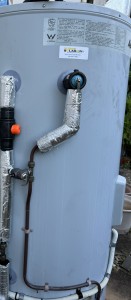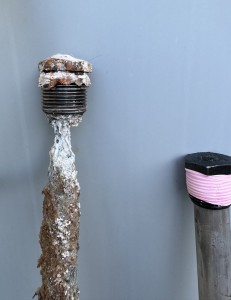Extending the life of your hot water heater not only helps you save on replacement costs but also ensures that your system operates efficiently and reliably for a longer period. Here are some tips and practices to ensure your hot water heat lasts as long as possible.
1. Regular Maintenance and Inspection
- DIY Inspections: Periodically check for any signs of leaks, rust, or corrosion around the heater and the connections.
- Professional Check-Ups: Schedule a professional inspection every 4-6 years to check for any potential issues that might need attention.
2. Test the Pressure Relief Valve
- Safety Mechanism: The pressure relief valve is crucial for the safety of your water heater. Test it every 6 months by lifting the valve handle to ensure it opens and closes properly.
- Prevent Explosions: A malfunctioning valve can lead to excessive pressure build-up, which can be dangerous.
2. Drain and Flush the Tank Annually
- Remove Sediment Build-up: Sediment build-up can reduce the efficiency of your heater and cause damage over time. Drain and flush your tank annually to remove these deposits.
- Partial Drains: If a full flush is not feasible, perform partial drains more frequently to minimise sediment accumulation.
3. Check and Replace the Anode Rod
- Corrosion Prevention: The anode rod helps prevent corrosion inside any mild steel, or non-stainless steel tank. Check it every 1-2 years and replace it if it is significantly corroded (less than ½ inch thick or coated with calcium).
- Extend Tank Life: A functioning anode rod can significantly extend the lifespan of your water heater by protecting the tank from rust.
5. Set the Thermostat to 60°C
- Prevent Overheating: Keeping the temperature at 60° reduces the risk of overheating, which can wear out your tank and increase energy costs.
- Safety: This setting is also safer for your household as it combats legionella growth.
6. Insulate the Tank and Pipes
- Reduce Heat Loss: Insulate the tank and the hot and cold water pipes to minimise heat loss, which helps your heater operate more efficiently.
- Energy Savings: Insulation helps maintain water temperature, leading to less frequent heating cycles and lower energy usage.
7. Install a Pressure Reducing Valve
- Control Water Pressure: High water pressure can strain your heater and reduce its lifespan. Installing a pressure reduction valve is recommended.
- Prevent Damage: Maintaining optimal water pressure helps prevent leaks and prolongs the life of your system.
9. Use a Water Heater Timer
- Schedule Heating: A water heater timer allows you to schedule heating cycles, reducing unnecessary operation and wear on your heater.
- Energy Efficiency: Timers can also help lower energy costs by reducing the amount of time the heater is actively heating water.
3. Install a Water Filter
- Reduce Mineral Buildup: Hard water is a major cause of sediment buildup. Installing a water filter helps reduce the amount of minerals entering your heater, thereby reducing sediment accumulation.
10. Avoid Overloading the Heater
- Match Demand: Ensure your water heater is adequately sized for your household’s needs. Overloading a small heater with high demand can lead to faster wear and tear.
- Use Water Efficiently: Encourage water-saving practices to reduce the strain on your water heater.
11. Install a Heat Trap
- Reduce Heat Loss: Heat traps prevent heat loss through the pipes when the heater is not in use, improving efficiency and extending the heater’s life.
- Lower Energy Costs: They help maintain water temperature, reducing the need for frequent reheating cycles.
12. Check for and Fix Leaks Promptly
- Prevent Damage: Leaks can lead to significant damage over time. Regularly check for any signs of leakage and repair them promptly.
- Save Water: Fixing leaks not only prevents damage but also conserves water, reducing your utility costs.
13. Upgrade to a More Efficient Model
- Consider Efficiency: If your water heater is older, consider upgrading to a more energy-efficient model. Modern heaters are designed to be more efficient and durable.
- Energy Savings: Newer models may offer features such as better insulation and more precise temperature control, leading to lower energy bills.
- Know When to Replace: Recognising early signs can help you avoid costly emergency replacements and ensure you have reliable hot water when you need it.
- Signs of Failure: Be aware of signs that your water heater may be failing, such as frequent leaks, inconsistent water temperature, and rusty water.
- Plan for Replacement: Planning for a replacement before a catastrophic failure can save you from emergency repairs and potential water damage.
By implementing these practices, you can effectively extend the lifespan of your hot water heater, ensure its efficient operation, and avoid costly repairs or replacements.
Give us a call with any questions or concerns today!
